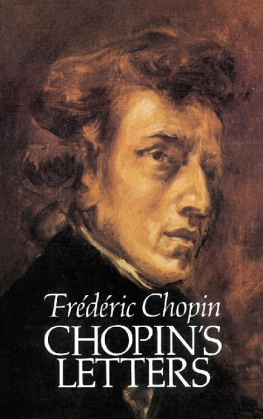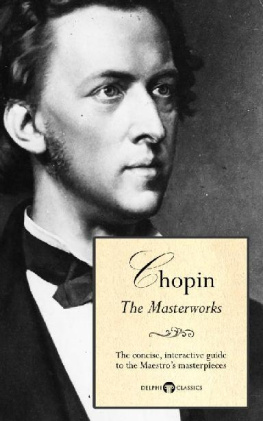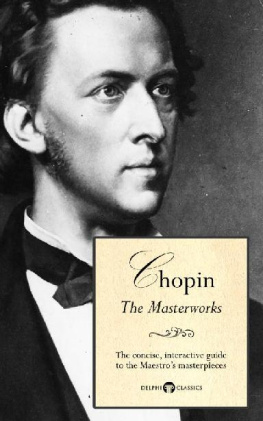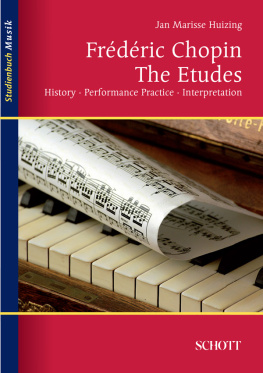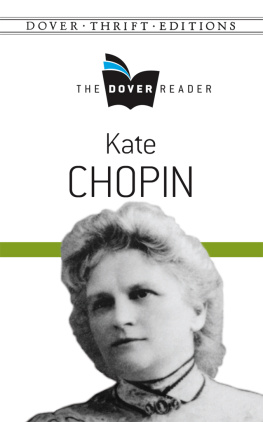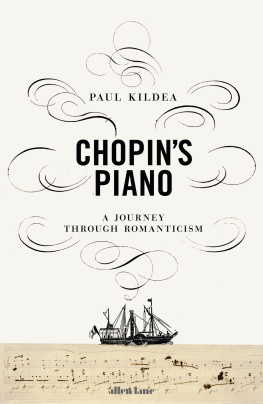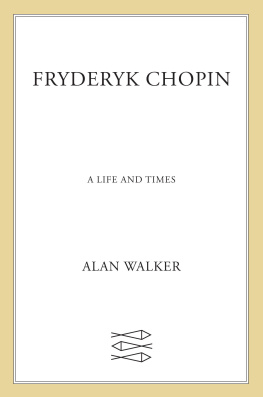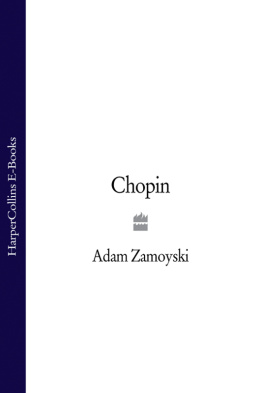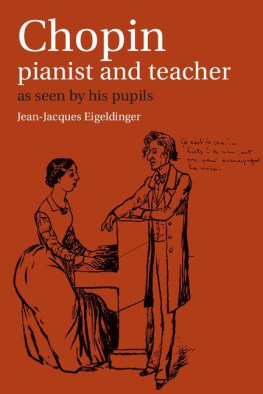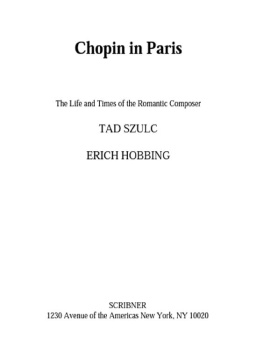Chopns Letters

FRDRIC CHOPIN
Chopns Letters

Collected by HENRYK OPIESKI
Translated, with a preface and editorial notes, by
E. L. VOYNICH
DOVER PUBLICATIONS, INC.
NEW YORK
This Dover edition, first published in 1988, is an unabridged, slightly corrected republication of the edition originally published by Alfred A. Knopf, Inc., New York, in 1931.
Library of Congress Cataloging-in-Publication Data
Chopin, Frdric, 18101849.
[Correspondence. English. Selections]
Chopins letters / Frdric Chopin; collected by Henryk Opieski; translated, with a preface and editorial notes, by E. L. Voynich.
p. cm.
Reprint. Originally published: New York : Knopf, 1931.
Includes index.
ISBN-13: 978-0-486-25564-4 (pbk.)
ISBN-10: 0-486-25564-6 (pbk.)
1. Chopin, Frdric, 18101849Correspondence. 2. ComposersCorrespondence. I. Opieski, Henryk, 18701942. II. Voynich, E. L. (Ethel Lillian), 18641960. III. Title.
[ML410.C54A4 1988]
786.10924dc 19
[B]
87-25171
CIP
MN
Manufactured in the United States by Courier Corporation
25564608
www.doverpublications.com
Contents
PREFACE
These letters, which I believe have not before appeared in English as a complete collection, are of great interest from several points of view.
They throw light on the genesis of some of Chopins compositions; on his character, personality and mental habits; on his teachers, colleagues and pupils; on the environment which moulded his childhood, and the inhibitions which throughout life hampered him, both as a musician and as a man. We see here the conflicting influences of Bach and of Italian opera; of Polish folk-song and of pianistic virtuosity; his tragic devotion to George Sand and his utter inability to understand her; the crystalline clarity of his artistic instinct, and the imperfect thinking which enabled him, after living for years among French intellectuals, to retain almost unmodified the provincial prejudices of his youth.
We see his delightful relations with the family at home; his affectionate loyalty to old friends, and perpetual unconscious exploitation of them; his irritable temper and warm heart; his Rabelaisian jokes and essential conventionality; his protecting tenderness to Solange Clsinger; his nave contempt for Jews and English, for publishers, Portuguese and similar inferior creatures; his charming modesty and regal pride; and his acceptance, at their own valuation, of the crowd of rich amateurs and brainless royalties, in whose palaces his genius permitted to him the status, now of a tame prodigy, now of a poor relation.
Editing has proved no easy task. I feel that these letters would lose much of their value and interest for English-speaking readers without some knowledge of the persons and events constantly referred to in them. There are so many of these that even had it been possible to trace them all any adequate mention would have overweighted the book with footnotes. Where I have used Dr. Opieskis admirable notes or quoted from other authors, I have appended an acknowledgment: Op. = Opieski; Kar. = Karowicz; Hoes. = Hoesick; Leicht. = Leichtentritt. Where no such acknowledgment is made, the note is my own.
In the case of a few very famous or widely known names, as: George Sand, Mickiewicz, Humboldt, Arago, Jenny hind, it has appeared to me sufficient to put just the dates of birth and death, without any biographical details.
It has sometimes been hard to decide which reference is relevant and illuminating, and which superfluous. How much space should be allotted, for example, to the frequently mentioned public affairs of Poland? It depends on the place they held in Chopins affections; and just what that place was I do not know, and doubt whether he did. His love for his native land: for its speech, its proverbs, its humour, its songs, its folkways, is beyond question; nor can any serious reader doubt the sincerity of his sympathy with its desperate struggle against alien oppression. Yet that sympathy had strange bedfellows. That he took no part in the struggle need not surprise us; the wind bloweth where it listeth, and a creative artist, however keen his sympathies, must live under the compulsion of his art. But it is a little startling to find a Polish patriot not merely keeping but proudly treasuring a diamond ring given him by the Tzar, and, even after 1831, accepting favours from the Grand Duke Constantine.
Scarcely less puzzling is the fragment of a diary (pp. 14850) said, on the authority of the late Count Stanislaw Tarnowski, a Polish university professor who published it in 1871, to have been written in Stuttgart in 1831, on the receipt of the news that Warsaw had been taken and sacked by Russian troops. What Chopin must have suffered while waiting to learn the fate of his relatives and friends, we can guess from the music composedduring those terrible days; it is easy to believe that his imagination was haunted, as well it might be, by nightmare images of his mother murdered and his young sisters struggling in the grasp of drunken soldiers; but that such a diary as this, and such music, could come from the same hand, in the same week, is surely somewhat strange.
As others also seem to have been puzzled by this riddle, I asked Dr. Opieski his opinion as to the authenticity and accuracy of the fragment, and quote from his prompt and courteous reply. Count Tarnowski had the MS. (the original? or a copy?) from Chopins friend, Princess Marcellina Czartoryska. The original was later accidentally destroyed; but Dr. Opieski assures me that no Polish biographer has ever doubted the Tarnowski version; and mentions, as a psychological corroboration which should set my doubts at rest, that very coincidence with the music which first aroused them.
In deference to his conviction, I include the fragment. Since the diary no longer exists and all the persons connected with it are dead, each reader must decide for himself whether he can reconcile this kind of thing, either with the raging passion of the D minor Prelude and C minor Etude or with the stifled agony of the E minor Prelude. The human mind is a queer jumble, and it is possible that Chopin really did write like that. But, remembering how easilyand how innocentlyplatitudes and appropriate sentiments find their way into the defenceless mouths of the dead; how much apocryphal stuff was circulated about Chopin even during his life, how short a time he had been underground when Turgeniev failed to discover a fashionable watering-place without at least one titled lady in whose arms this composer breathed his last; it seems only fair to give him the benefit of the doubt.
Another difficulty was the problem of attributions. Where Chopin seems to have really used a Polish folk-tune, I have tried to give the actual tune in the best version I could find. Where responsible authors appear to believe that a composition may have been inspired by a poem, I have given a reference to the poem; but it seems to me that fanciful and probably groundlessinterpretations of or names for particular Mazurkas or Preludes are best ignored.
The case of the four Ballades is a special one. Whether there is any authentic evidence of their supposed connection with Mickiewiczs wonderful ballads, I do not know. But that Chopin and Mickiewicz were personal friends; that the composer was much under the poets influence; that he knew and was deeply impressed by the ballads, we know; and I have therefore felt justified in devoting a little space to them.
Next page
